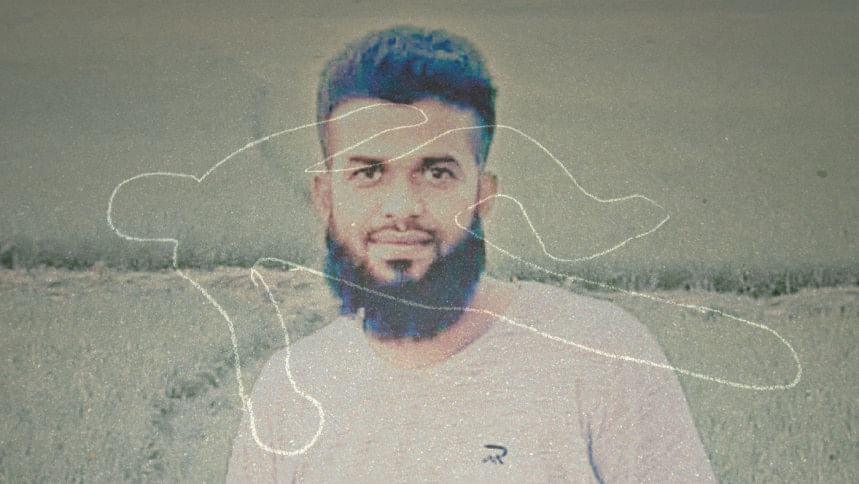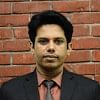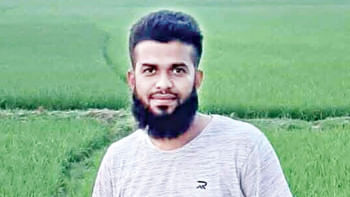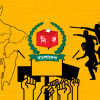Sohag's murder was not an anomaly, it was a warning

When Sheikh Hasina's authoritarian regime finally fell, millions across Bangladesh heaved a collective sigh of relief. The country had suffered years of political repression, corruption, and institutional decay. People hoped that with the dawn of the interim government, peace would return, justice would prevail, and power would shift back to the people. There was widespread anticipation that this change would bring not just a new administration but a new moral compass for the nation. Sadly, that optimism is beginning to feel increasingly more naïve.
The truth is difficult to ignore: the way the interim government is handling law and order raises serious concerns. Bit by bit, certain political groups seem to be asserting control, while individuals with political backing are terrorising ordinary people without fear of consequence. Given these developments, it's not unreasonable to say the government is beginning to lose its grip, not because it lacks public support or opportunity, but because it appears either unable or unwilling to confront the deeply rooted alliance between crime and politics that has long corroded this country.
Instead of actively confronting the crimes committed by politically affiliated individuals, the government seems to be relying on some kind of moral awakening within party leaderships, as if things will somehow sort themselves out. But that's not how justice works. What we hoped would be a clean break from a violent, corrupt past is now starting to look like a quiet handover from one set of enforcers to another.
Nothing illustrates this breakdown more horrifically than the recent lynching near Sir Salimullah Medical College Mitford Hospital in Old Dhaka. A businessman named Sohag was murdered in broad daylight, his head and body crushed with bricks and chunks of concrete. His bloodied, lifeless body was dragged and stomped on in front of hundreds of silent onlookers. Not one person intervened. Not a single voice protested. The cruelty was not committed in a dark alley or behind closed doors. It was an open performance of power, a terrifying declaration that: "we are above the law."
And why did no one resist? Because people knew, those eight or 10 killers were not alone. They had powerful backers, politically connected patrons who would shield them from consequences. The citizens were not silent because they lacked morality; they were silent because they lacked protection. In a country where criminals enjoy political sponsorship, to protest is to risk your life.
This is not a new story. What usually follows when a politically affiliated person commits a heinous crime and the public outcry becomes too loud to ignore is that the party in question swiftly distances itself. A press note is issued. A statement is read aloud condemning the act and disowning the perpetrator. The party claims it had no idea, and the person acted independently. But let us ask: is it really possible that such criminals, capable of instilling fear across neighbourhoods, committed their first crime "after" joining the party? Or is it more likely that they were already known thugs, embraced by political circles precisely because of their capacity for intimidation and extortion?
The political ecosystem in Bangladesh has, for too long, depended on these enforcers, fundraisers, and vote-riggers. Parties need muscles to dominate local areas, silence dissent, and keep money flowing. As long as these criminals serve a purpose, they are protected. When they become liabilities, they are thrown under the bus, not for justice, but for damage control.
The interim government had a once-in-a-generation chance to break this cycle. With overwhelming public support, they could have launched a full-scale cleansing of the political-criminal nexus. They had the mandate. They had the moral high ground. They had the people, the police, the army, and the intelligence agencies. Instead, they chose half-measures. Did the power vacuum left by the previous regime fill with backroom deals and political compromises instead of justice?
And this raises urgent concerns for the future.
If the interim government cannot stop extortion and mob violence today, how will it ensure free and fair elections tomorrow? What guarantee do we have that the upcoming polls will not be hijacked by the same muscle power we just witnessed near Mitford? How can qualified, honest leaders contest elections if the streets remain ruled by terror?
This is not just about political power, it's about our survival as a democratic society. If violence becomes the language of political competition, then integrity becomes obsolete, and the ballot becomes meaningless.
We, the people, are watching. We did not rise merely to replace one set of oppressors with another. We rose to reclaim the soul of this country. But that soul is bleeding on the streets of Dhaka.
The gruesome killing of Sohag is not an isolated incident; it is a mirror. A reflection of what we have allowed to grow in our neighbourhoods, in our parties, and our institutions. It is also a warning. If we do not act now, if we do not demand accountability, we will all remain hostages to a system that thrives on fear.
So let us be clear. There is no place in Bangladesh for political parties that harbour criminals. There is no room for law enforcement agencies that look away. And there is no excuse for a government, interim or elected, that fails to act.
This is not about left or right, old or new. This is about civilisation versus chaos. We must stand together to dismantle the machinery of political violence, no matter who benefits from it. We must uproot not just the thugs on the streets but also those in suits who give them orders from the shadows.
Sohag is gone. Tomorrow, it could be you. Or me. Let this be the revolution we finish, not the one we abandon.
Md Kawsar Uddin is associate professor in the Department of English and Modern Languages at the International University of Business Agriculture and Technology (IUBAT).
Views expressed in this article are the authors' own.
Follow The Daily Star Opinion on Facebook for the latest opinions, commentaries and analyses by experts and professionals. To contribute your article or letter to The Daily Star Opinion, see our guidelines for submission.

 For all latest news, follow The Daily Star's Google News channel.
For all latest news, follow The Daily Star's Google News channel. 










Comments